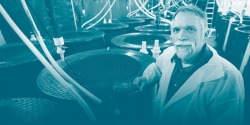The Transformers- Ocean Frontier Institute-Led Research to Change Global Aquaculture Industry

As Memorial’s lead on sustainable aquaculture within the Ocean Frontier Institute (OFI), Dr. Matt Rise of the Department of Ocean Sciences is excited about the opportunities the new initiative will bring.
“It is really going to be transformative for ocean-based science at Memorial, and a very important aspect of our next seven years of research and beyond,” he said. “It definitely builds on our current strengths and expertise, but it will also support and build future collaborations with researchers at universities, companies, government agencies and other groups involved in sustainable aquaculture.”
Dalhousie University, the University of Prince Edward Island and Memorial are coming together in an historic partnership to form the Ocean Frontier Institute, each bringing their individual strengths in science relating to atmosphere-ocean interaction, ecosystems, fisheries, aquaculture and social science to the table.
Creative solutions
In the Department of Ocean Sciences, research has been ongoing on the development of novel feeds for farmed salmon using genomics methods and other tools to aid in the creation of sustainable grower feeds and clinical diets. These diets are intended to not only be sustainable, plant based for example, but also to help protect against diseases.
This work is addressed under the sustainable aquaculture module of the OFI.
“This research builds on a collaboration we already have with EWOS, one of the major aquafeed companies in the world, as well as collaborators in Norway, Chile and France,” said Dr. Rise. “Related research is being funded by Genome Canada, but the OFI will now allow us to do complementary research that will build on this foundation, and give us a mechanism to put together teams to tackle issues as they arise, such as emerging infectious diseases, and to find creative solutions with industry partners.”
“OFI will be a hub that fosters better integration with our partner institutions — Dalhousie and UPEI — and other national and international partners.”
The OFI will also facilitate research into the impact of climate change on salmon stress (welfare) and disease susceptibility, and into the development of genetic markers to help select salmon that are resistant to elevated temperatures and specific pathogens.
“These salmon will be able to mount robust immune responses to protect themselves against disease in the face of climate change effects, such as elevated temperatures,” said Dr. Rise. “That’s also a collaboration with several other academics and companies.”
Cross-disciplinary projects
Other components of the sustainable aquaculture module include research on “cleaner fish” — using lumpfish and cunner to control sea lice in salmon cages — and alternative or new aquaculture species, the development of research and diagnostic tools for studying the impact of pathogens and climate change on fish and for the improvement of vaccines, the effects of aquaculture on marine ecosystems, and the development of biorefinery techniques and processes that can be used to produce nutritional and valuable products from aquaculture waste materials.
“OFI will be a hub that will foster better integration with our partner institutions — Dalhousie and UPEI — and other national and international partners,” said Dr. Rise. “In addition to connecting Memorial to research institutions nationally and internationally, I think OFI will also foster better integration between our own departments, such as the Department of Ocean Sciences and the Department of Biology, but also with other faculties such as the Faculty of Humanities and Social Sciences (HSS) and with the Marine Institute.
“The Marine Institute, for example, is integral to OFI modules for sustainable fisheries research, and Dr. Ratana Chuenpagdee in HSS is leading research on sustainable communities linked to fisheries,” Dr. Rise continued. “Both of these areas of research will also explore connections with sustainable aquaculture. The OFI is designed to enhance opportunities for us to interact and create cross-disciplinary projects between these areas, and to simultaneously consider different aspects of the challenging area of sustainable aquaculture and its impacts on society.”
The next generation
Dr. Rise says that the anticipated additional 147 positions at Memorial for graduate students, post-doctoral fellows, technicians and research associates funded by the OFI will also have a major impact on the university.
“This module will train the next generation of marine scientists in the techniques and approaches we need to solve complex problems related to sustainable aquaculture.”
“Highly qualified personnel (HQP) are crucial to the OFI, Memorial and the future of Canada’s oceans,” he said. “As OFI gets established, and we start setting the specific work plans and the teams that will be doing OFI research, there will be opportunities for additional HQP in all of the key areas of the sustainable aquaculture module. This module will train the next generation of marine scientists in the techniques and approaches we need to solve complex problems related to sustainable aquaculture.”
Just as important are the collaborations with government scientists, such as those from the Department of Fisheries and Oceans (DFO), Environment and Climate Change Canada and the Canadian Food Inspection Agency (CFIA).
“We already work extensively with DFO scientists, but now we will be able to collaborate more with CFIA and other groups,” said Dr. Rise. “OFI will allow us to work closely in teams that have the right people and organizations represented.”
The Ocean Frontier Institute (OFI) is an historic partnership between Dalhousie University, Memorial University of Newfoundland and the University of Prince Edward Island. Created through a nearly $100-million federal investment, the OFI will focus on solutions for safe and sustainable ocean development. Through its unique partnership with its research partners, Memorial will lead breakthroughs in four key areas: sustainable fisheries; sustainable aquaculture; marine safety; and ocean data and technology. Learn more about the OFI here.